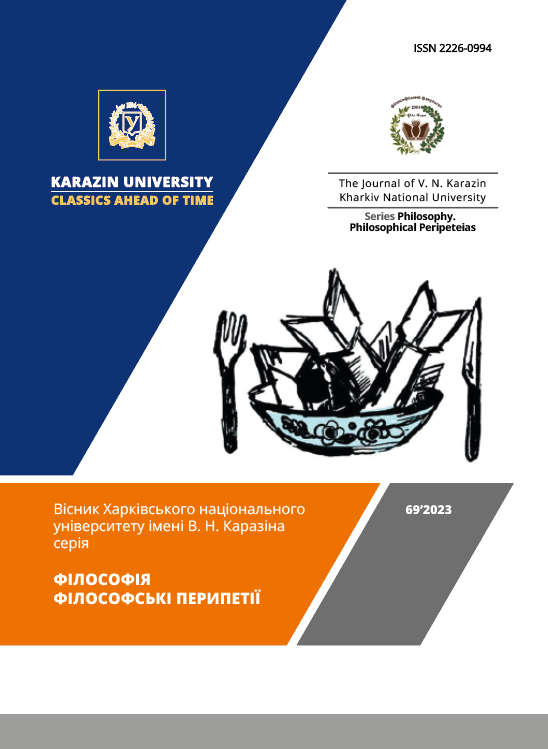МІФИ ПЛАТОНА
Анотація
У статті розглядається питання про відношення Платона до міфології. Автор стверджує, що Платон був непримиренним критиком традиційного міфу і поетичної міфотворчості, тому що такі міфи спотворювали справжні образи богів та їхніх діянь. Поетичні міфи погано відображаються на вихованні, тому їхніх творців, як вважав Платон, слід видалити зі справедливої держави. В статті звернено увагу на те, що сам Платон був значним міфотворцем – багато важливих філософських ідей він розказує саме в формі міфів. Автор аналізує причини звернення Платона до міфу, визначає функції, які виконує міф у діалогах Платона, значення платонівської міфотворчості для філософії і міфології. Зазначено, що Платон використовує міф як інструмент виразності, розглядає його як ефективний засіб переконання. З іншого боку, в статті доводиться теза про те, що платонівській міф є способом висловитись про ті глибинні проблеми буття, які не може осягнути людський розум. Тому міфи Платона оповідають про те, що відбувається на небі, під Землею в Аїді, в далекому минулому. В статті робиться висновок про те, що в платонівській міфотворчій діяльності відбувається суттєва реформа всієї давньогрецької міфології. Платон поєднує міф з раціональним мисленням, з Логосом. Платонівській міф – раціоналізований міф, в якому божественний вимір набуває вже не тільки космос, а й людина та її світ, поліс. Так діалектик стає творцем міфів. Платон, стверджується в статті, стає міфотворцем тому, що для нього вкрай важливо знайти в людській душі опору для людини, таку ж надійну і вічну, якою раніше слугував божественний космос традиційних міфів.
Завантаження
Посилання
Brisson, L. (1998). Plato the Mythmaker. Chicago, Ill.: University of Chicago Press.
Jasso, J. J. (2019). Sympathy for the devil: the myth of Plato as the enemy of rhetoric. Rhetorica, 37 (4), 351-381.
Keum, Tae-Yeoun. (2020). Plato and the Mythic Tradition in Political Thought. Cambridge (Mass): Harvard University Press.
Layne, D.; Schmidt, E. (2019). Pseudos, Kalos and Eikos Mythos in Plato and Film. Leiden: Brill Academic Pub (Value Inquiry Book Series 332).
Reinhardt, K. (1927). Platons Mythen. Bonn: Kohen.
Sevelsted, R. (2021). Myth and Truth in Republic 2-3. Plato Journal, 22, 115-131.
Synek, S. (2019). Obraz lidského světa v Platónově podobenství o jeskyni [The Picture of the Human World in Plato’s Myth of the Cave]. Filosofický časopis, 67 (1), 3-20.
Vidal-Naquet, P. (2005). L’Atlantide. Petite histoire d’un mythe platonicien. Paris: Les Belles Lettres.
Weinman, M. (2017). The Myth of Er as rationalizing recording device. Existenz, 12/2, 49-57.
Zeller, E. (1920). Grundriss der Geschichte der griechischen Philosophie. 12 Auflage. Leipzig: O.R. Reisland.
Авторське право (c) 2023 Володимир Прокопенко

Цю роботу ліцензовано за Міжнародня ліцензія Creative Commons Attribution 4.0.
Автори, які публікуються у цьому журналі, погоджуються з наступними умовами:
- Автори залишають за собою право на авторство своєї роботи та передають журналу право першої публікації цієї роботи на умовах ліцензії Creative Commons Attribution License 4.0 International (CC BY 4.0), котра дозволяє іншим особам вільно розповсюджувати опубліковану роботу з обов'язковим посиланням на авторів оригінальної роботи та першу публікацію роботи у цьому журналі.
- Автори мають право укладати самостійні додаткові угоди щодо неексклюзивного розповсюдження роботи у тому вигляді, в якому вона була опублікована цим журналом (наприклад, розміщувати роботу в електронному сховищі установи або публікувати у складі монографії), за умови збереження посилання на першу публікацію роботи у цьому журналі.
- Політика журналу дозволяє і заохочує розміщення авторами в мережі Інтернет (наприклад, у сховищах установ або на особистих веб-сайтах) рукопису роботи, як до подання цього рукопису до редакції, так і під час його редакційного опрацювання, оскільки це сприяє виникненню продуктивної наукової дискусії та позитивно позначається на оперативності та динаміці цитування опублікованої роботи (див. The Effect of Open Access).






3.gif)




